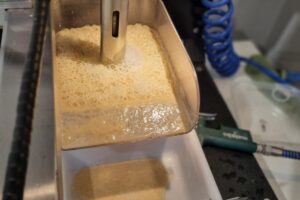
Dual connectivity to improve network access speed
February 1, 2020
Algorithms for energy optimisation and flexibility for 5G network infrastructures
February 1, 2020The researcher Farayde Fakhouri from the Centre Català del Plàstic (CCP) at the UPC leads a project to develop ‘packaging’ based on plant-based raw materials that protects foods and extends their useful life. To test the efficiency of the new material, the research team used it to cover strawberries from the Maresme region. The packaging increased their resistance to mould and maintained their original appearance for a longer time.

Farayde Fakhouri, researcher at the Centre Català del Plàstic (CCP) a TECNIO centre, has created a biodegradable, edible, natural packaging for the food sector. This packaging has been created from plant-based raw materials to promote the circular economy and guarantee the properties that protect food and extend its useful life.
The sustainable packaging comes from plant-based sources comprised of natural compounds that have a range of properties. When they are combined with other materials, these compounds can modify the interaction of food with the atmosphere. This prolongs the life of food. The packaging material is a more sustainable alternative to plastics. According to Fakhouri, the project is designed to respond to the “enormous global waste of foods, which is calculated to be 33% of total production and 45% of fruit and vegetables, according to data from Stop Food Waste Day in 2019. Our motivation has been to contribute to the development of biodegradable, edible packaging that helps to extend the useful life of foods and is also environmentally friendly”, explained Fakhouri, an engineer and PhD in food technology.
As part of this project, which was developed over two years, strawberries from the Maresme region were used to test how efficiently the packaging can keep the fruit in a good state. According to Fakhouri, it was established that “the use of this material as a covering for strawberries increased their useful life as it increased the resistance of the fruit to mould, reduced the loss of mass, and conserved the original appearance for longer.”
Currently, doctor Fakhouri and the research group Polyfunctional Polymeric Materials (Poly2) at the UPC, which is led by doctor José Ignacio Velasco, are validating their first formulations to develop new prototypes of packaging materials. In addition, the project was selected to participate in the Barcelona Technology Transfer Group programme of the IESE Business School, which is supported by ACCIÓ, to accelerate the transfer of the product to the market.
The project was backed by ACCIÓ via the TECNIOspring programme, which promotes the incorporation of talented, experienced people into Catalan companies and research and development institutions. With a budget of ten million euros provided by ACCIÓ and the European Commission, this initiative, as part of the Marie Sklodowska-Curie actions in the Horizon 2020 programme, finances up to 100% of the hiring of researchers to promote research and development in companies and technology transfer in Catalonia. Using this financial aid, the Centre Català del Plàstic (CCP) hired the Brazilian researcher Farayde Fakhouri in 2017 to develop the project together.
Technology
Topic
You want to know more?
Related Projects
- Researchers from the UPC are participating in the Quartz Enrichment Enabling Near-Zero Silicon (QUEEN) project, aimed at reducing the European Union’s dependence on external sources for critical raw materials, particularly metallurgical-grade silicon (MG-Si). To achieve this, the project proposes harnessing an underused resource: quartz sand from European quarries, to produce MG-Si locally, sustainably, and efficiently.
- A multidisciplinary team of researchers from the Research Group in Smart and Sustainable Resources and Industries (RIIS), the Sustainable Mining Research Group (GREMS), and the Construction Materials and Roads (MATCAR) group at the Universitat Politècnica de Catalunya – BarcelonaTech (UPC) is leading the VALORFIN project. The aim is to develop a technological solution for the valorisation of the fine fraction of construction and demolition waste (CDW), transforming it into new low-CO₂-emission cementitious materials, while also reducing the presence of hazardous materials in this waste.
- 08/07/2025Project Headerrightno-repeat;left top;;auto20px The research groups River Dynamics and Hydrological Engineering (FLUMEN) and Construction Materials and Roads (MATCAR) at the Universitat Politècnica de Catalunya – BarcelonaTech […]
- The Innovation in Materials and Molecular Engineering – Biomaterials for Regenerative Therapies (IMEM-BRT) research group at the Universitat Politècnica de Catalunya – BarcelonaTech (UPC), in collaboration with the Institute of Chemical Research of Catalonia (ICIQ), has developed polymer resins derived from plant-based materials to reduce the dependence of 3D printing on fossil fuel-based resins.




